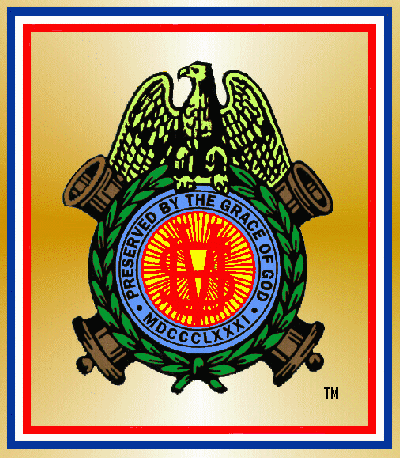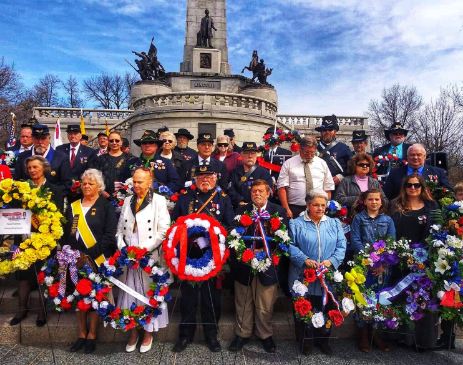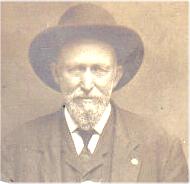Jacob Ruble
Sons of Union Veterans of the Civil War


Jacob Ruble Jacob Ruble was born to George and Mary (McClanahan) Ruble on December 17, 1838 in Mifflin County, Pennsylvania. His chances for an education on the family farm were rather limited, but he made the best of them, and became a fair scholar. When the Civil War broke out, he threw aside all personal ambitions to serve his country in her hour of need, and in the trying years that followed proved a patriotic, brave, and faithful soldier, both in camp and on the field. Along with his two younger brothers, John and Geroge, he, at the age of 22, enlisted at Lewiston, Pennsylvania as a Private into Company C, 1st Pennsylvania Reserve Cavalry. He subsequently served for a period of three years and two months in this regiment.
In one communication, Colonel John P. Taylor of Reedsville, Pennsylvania, his commanding officer, paid him the following tribute, Comrade Ruble was a gallant soldier. He faced the enemy of “Old Glory” in 28 battles and 30 skirmishes, of which Gettysburg was perhaps the hardest. He was never sick a day while in the army and escaped as by miracle from being wounded, though he had two horses shot out from under him, one at Brandy Station and another at Cold Harbor, Virginia. During the Battle of Brandy Station, Colonel Taylor gave the following report to Lieutenant William P. Lloyd, Assistant Adjutant General, 2nd Brigade, 3rd Division, Com. C.
Lieutenant:__, I have the honor to respectfully submit, in brief review, the part my regiment took in the late cavalry fight at Brandy Station, Va., June 9, 1863. On Monday, the 8th, the Cavalry Corps, commanded by General Pleasanton, according to orders, left this place(Warrenton Junction) at 2 P.M.; the 1st and 4th divisions commanded by General Buford, taking up the line of march leading to Beverly ford. The 2nd and 3rd divisions commanded by General Gregg, proceeded to Kelly’s ford; both commands arrived at the fords about dark, and bivouacked for the night.
Before sunrise the following morning, the roar of cannon told us that the “ball had opened at Beverly ford. General Gregg’s command immediately proceeded to cross the river. Colonel Dufie, commanding the 2nd division, taking the advance, followed by the 3rd division and thus proceeding to Stevensburg, about four miles from Kelly’s ford. At this point, General Gregg, leaving Colonel Dufie with his command to protect his left flank and rear, proceeded with the 3rd division on a road running parallel with the river, leading direct to Brandy Station. The 2nd Brigade, composed of the 1st Pennsylvania, 1st New Jersey, and 1st Maryland regiments commanded by Colonel Wyndham, took the advance, followed by 1st Brigade, commanded by Colonel Kilpatrick.
No sooner had we arrived at Brandy Station, on the left and rear of the enemy, than their guns were opened upon us, at a range of one thousand yards. Our battery was immediately placed in position and engaged their guns, while Colonel Wyndham hastened to attack with his cavalry. One battalion of the 1st Maryland, led by Major Russel, charged upon their battery, followed by the remainder of the 1st Maryland, led by Colonel Deemes, and the 1st New Jersey led by Colonel Wyndham in person. At the same time swinging my regiment around to the right, I led a desperate charge upon their left and rear, coming to the Barbour House, in which was General J.E.B. Stuart, staff and body guard, surrounded by cavalry, with whom we spent thirty minutes in hand to hand conflict, killing and wounding and bringing away a number of prisoners, among whom was General Stuart’s assistant adjutant-general, captured but a few feet from the renowned General Stuart himself. In this entire charge and conflict my men depended alone upon the cavalryman’s true weapon, and tested the true merit and power of the saber ... .
Jacob was promoted to Corporal on July 1, 1862 and to Quartermaster Sergeant on July 1, 1863 - just before the Battle at Gettysburg. He was mustered out of federal service with his regiment on September 9, 1864.
Jacob married Elizabeth Williams in Feburary 1865, and, in the fall of that year, they moved to Pleasent Valley Township, Jo Daviess County, Illinois. Here they rented land for three years, then purchased 40 acres. He afterwards sold that tract and bought a farm of 108 acres successfully managing and improving this farm. They had four daughters. After his first wife passed away March 3, 1888, Jacob married Mrs. Mary E. Richards, (fromally Mary E. Leach), at Unionville, Pennsylvania on September 6, 1891. Mary’s first husband, Glen Richards, also was a soldier having served in Company D, 45th Regiment Pennsylvania Volunteer Infantry from September 6, 1861 to July 17, 1865.
After farming for 28 years, Jacob and his second wife moved to the village of Stockton, Illinois in 1893. Jacob was elected as a village trustee in 1895. He served as school director for a period of time. He was treasurer of the Ancient Free and Accepted Masons Plum River Lodge #554 for 20 consecutive years. He also was a faithful member of the Stockton, Illinois Grand Army of the Republic (GAR) J.A. Maltby Post #520 and filled the chair of Commander as well as many other positions of confidence in the Post. He was a member of the First Methodist Church official board for many years.
A few weeks before Jacob’s death, he expressed a desire to accompany the “boys” to Washington D.C. to attend the National GAR Encampment but remarked at the same time, I feel as if I would not have many more days in this world. Jacob passed away on Thursday morning near 8 o’clock, October 14, 1915. He was laid to rest at the Morseville Plum River Cemetery beside his first wife Elizabeth.
Photograph and information submitted by Jacob Ruble's great great grandson, Nicholas D. Rhoads, Charter Member, Corporal Louis Renninger Camp #1, SUVCW, in Springfield, Oregon.
Jacob Ruble







